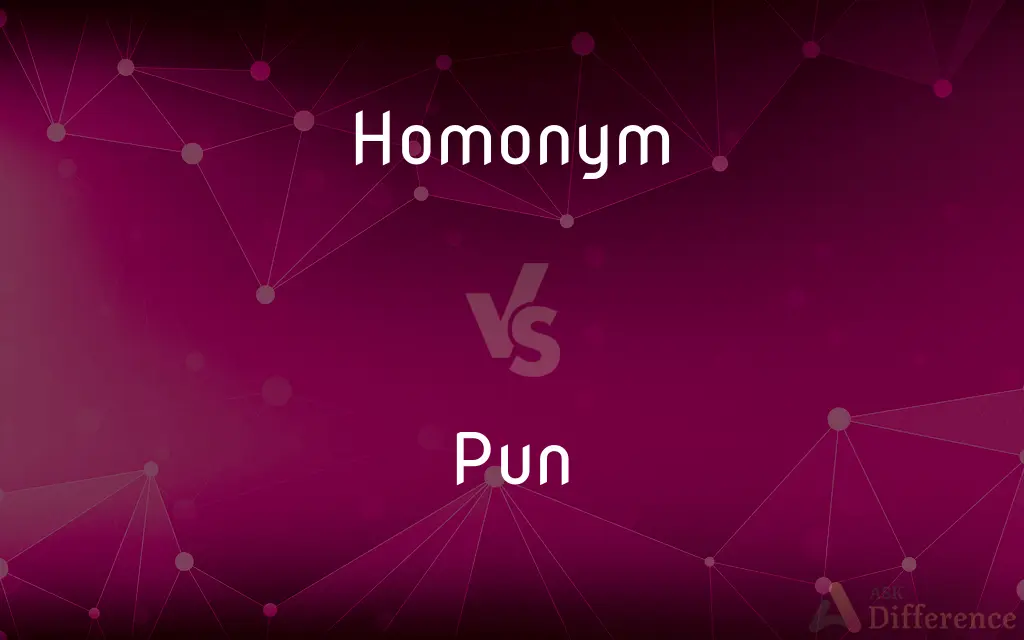Homonym vs. Pun — What's the Difference?
Edited by Tayyaba Rehman — By Urooj Arif — Updated on March 20, 2024
Homonyms are words with the same spelling or pronunciation but different meanings; puns are jokes exploiting the multiple meanings of words or their similar sounds.

Difference Between Homonym and Pun
Table of Contents
ADVERTISEMENT
Key Differences
Homonyms are a linguistic phenomenon where two words share the same spelling (homographs) or pronunciation (homophones) but have distinct meanings and origins. They arise naturally in language evolution, leading to situations where a single form can refer to multiple unrelated things or concepts, such as "bat" (a flying mammal) and "bat" (a piece of sports equipment). Puns, on the other hand, are a form of wordplay that deliberately exploits the ambiguity of homonyms or the similarity of sounds between different words to create humorous or rhetorical effects. For instance, a pun might play on the word "bass" to refer both to a type of fish and the low sound in music, generating amusement through the unexpected connection.
While homonyms are an inherent part of language structure, puns are a creative use of language, relying on the speaker or writer's wit to craft a joke or clever remark. Homonyms can occur unintentionally in everyday speech or writing, merely as a result of the language's complexity. In contrast, puns are intentionally constructed to elicit a reaction, often humor, by highlighting the dual meanings or similar sounds of words within a specific context.
Homonyms serve as the foundation for many puns, providing the dual meanings or sound similarities that puns exploit for humorous or rhetorical purposes. However, not all uses of homonyms result in puns, and not all puns rely on strict homonymy; some may involve words that are merely similar in sound (paronomasia) rather than true homophones or homographs.
The appreciation of puns often requires a certain level of linguistic knowledge and cultural context, as understanding the joke hinges on recognizing the multiple meanings or sounds being played upon. Conversely, navigating homonyms effectively in communication demands an understanding of context to discern which meaning is intended, highlighting the cognitive and contextual aspects of language use.
While homonyms are a linguistic feature reflecting the complexity and richness of a language, puns are a creative and often humorous exploitation of that complexity, engaging language users in a deeper appreciation of linguistic nuances.
ADVERTISEMENT
Comparison Chart
Definition
Words that sound alike or are spelled the same but have different meanings.
A joke exploiting the different possible meanings of a word or the fact that there are words that sound alike but have different meanings.
Nature
Linguistic phenomenon.
Form of wordplay or humor.
Purpose
To convey different meanings despite similarity in form.
To create humor or rhetorical effect by exploiting words' multiple meanings or similar sounds.
Examples
"Bark" (the sound a dog makes) and "bark" (the outer layer of a tree).
"Time flies like an arrow. Fruit flies like a banana."
Usage
Occurs naturally in language.
Deliberately created by speakers or writers for effect.
Requires
Understanding of context to interpret correctly.
Awareness of language's nuances and cultural context to appreciate.
Compare with Definitions
Homonym
Homographs: spelled the same, different pronunciation/meaning.
Tear (rip) vs. Tear (from crying).
Pun
Requires linguistic knowledge to create and understand.
I’m reading a book on anti-gravity. It’s impossible to put down.
Homonym
Context determines meaning.
Crane can refer to a bird or a construction device.
Pun
Can rely on homonyms for effect.
Being struck by lightning is a shocking experience.
Homonym
Arises naturally in language.
Bank can mean the side of a river or a financial institution.
Pun
Enhances creativity in language use.
Santa’s helpers are known as subordinate Clauses.
Homonym
Words spelled and pronounced the same but differing in meaning.
Lead (to go in front) vs. lead (a metal).
Pun
Humorous use of words with similar sounds or multiple meanings.
I used to be a baker because I kneaded dough.
Homonym
Homophones: sound the same, different spelling/meaning.
To vs. Two.
Pun
Often found in jokes and witty comments.
Atheism is a non-prophet organization.
Homonym
In linguistics, homonyms, broadly defined, are words which are homographs (words that share the same spelling, regardless of pronunciation) or homophones (words that share the same pronunciation, regardless of spelling), or both. For example, according to this definition, the words row (propel with oars), row (argument) and row (a linear arrangement) are homonyms, as are the words see (vision) and sea (body of water).
Pun
The pun, also known as paronomasia, is a form of word play that exploits multiple meanings of a term, or of similar-sounding words, for an intended humorous or rhetorical effect. These ambiguities can arise from the intentional use of homophonic, homographic, metonymic, or figurative language.
Homonym
Each of two or more words having the same spelling or pronunciation but different meanings and origins.
Pun
A play on words, sometimes on different senses of the same word and sometimes on the similar sense or sound of different words.
Homonym
One of two or more words that have the same sound and often the same spelling but differ in meaning, such as bank (embankment) and bank (place where money is kept).
Pun
To make puns or a pun.
Homonym
A word used to designate several different things.
Pun
(transitive) To beat; strike with force; to ram; to pound, as in a mortar; reduce to powder, to pulverize.
Homonym
A namesake.
Pun
(intransitive) To make or tell a pun; to make a play on words.
We punned about the topic until all around us groaned.
Homonym
(Biology) A taxonomic name identical to one previously applied to a different species or other taxon and therefore unacceptable in its new use.
Pun
A joke or type of wordplay in which similar definitions or sounds of two words or phrases, or different definitions of the same word, are deliberately confused.
Homonym
A word that both sounds and is spelled the same as another word.
Pun
: a Korean unit of length equivalent to about 0.3{{nbsp}}cm.
Homonym
(loosely) A word that sounds or is spelled the same as another word (but not necessarily both), technically called a homophone (same sound, different spelling) or a homograph (same spelling, different sound), or if both are the same, a homonym.
Pun
To pound.
He would pun thee into shivers with his fist.
Homonym
(taxonomy) A name for a taxon that is identical in spelling to another name that belongs to a different taxon.
Pun
To make puns, or a pun; to use a word in a double sense, especially when the contrast of ideas is ludicrous; to play upon words; to quibble.
Homonym
A word having the same sound as another, but differing from it in meaning; as the noun bear and the verb bear.
Pun
To persuade or affect by a pun.
Homonym
Two words are homonyms if they are pronounced or spelled the same way but have different meanings
Pun
A play on words which have the same sound but different meanings; an expression in which two different applications of a word present an odd or ludicrous idea; a kind of quibble or equivocation.
A better put on this word was made on the Beggar's Opera, which, it was said, made Gay rich, and Rich gay.
Pun
A humorous play on words;
I do it for the pun of it
His constant punning irritated her
Pun
Make a play on words;
Japanese like to pun--their language is well suited to punning
Common Curiosities
Why are puns considered a form of wit?
Crafting puns requires linguistic skill and a deep understanding of word meanings and sounds.
What's the main difference between a homonym and a pun?
Homonyms are words with the same spelling/pronunciation but different meanings, while puns are jokes exploiting these properties for humor.
Do homonyms confuse communication?
They can, but context usually clarifies which meaning is intended.
Are puns used in literature?
Yes, writers often use puns to add humor, create double entendres, or enhance thematic complexity.
How can homonyms enhance language learning?
They highlight the complexity of language and encourage attention to context and pronunciation.
Can a word be both a homonym and used in a pun?
Yes, many puns are based on homonyms, using their dual meanings for humorous effect.
How do you identify a homonym?
Identify words that sound alike or are spelled the same but have different meanings, regardless of context.
Can puns be unintentional?
While puns are typically crafted for effect, accidental puns can occur, often noticed after the fact.
Why do some people dislike puns?
Some find puns to be overly simplistic or reliant on wordplay that seems contrived.
Are there languages without homonyms or puns?
Most languages have homonyms and the potential for puns due to the natural development of language and word meanings.
Share Your Discovery

Previous Comparison
Thermoplastic vs. Polypropylene
Next Comparison
Bechamel vs. RouxAuthor Spotlight
Written by
Urooj ArifUrooj is a skilled content writer at Ask Difference, known for her exceptional ability to simplify complex topics into engaging and informative content. With a passion for research and a flair for clear, concise writing, she consistently delivers articles that resonate with our diverse audience.
Edited by
Tayyaba RehmanTayyaba Rehman is a distinguished writer, currently serving as a primary contributor to askdifference.com. As a researcher in semantics and etymology, Tayyaba's passion for the complexity of languages and their distinctions has found a perfect home on the platform. Tayyaba delves into the intricacies of language, distinguishing between commonly confused words and phrases, thereby providing clarity for readers worldwide.













































